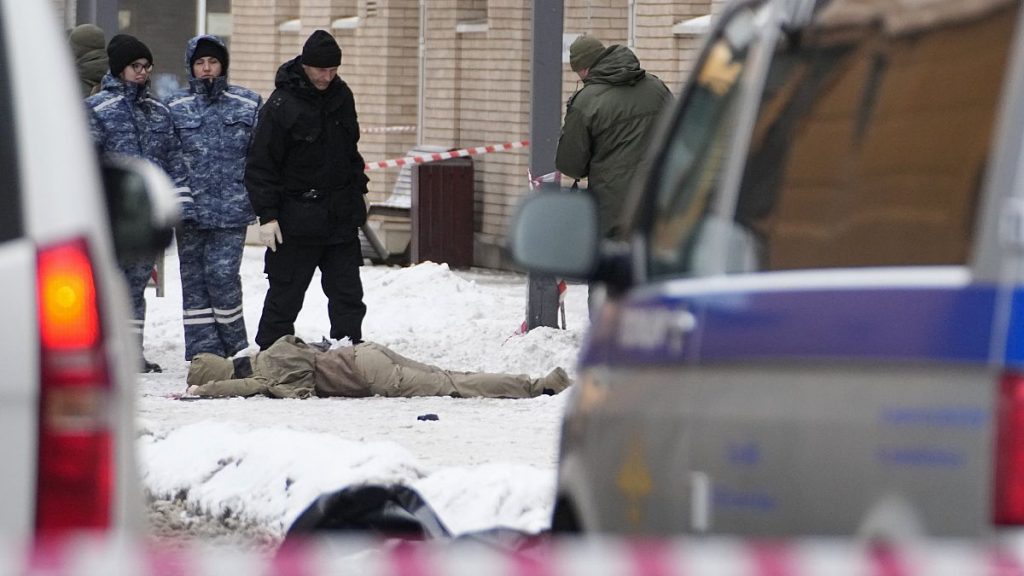The Federal Security Service (FSB), Russia’s principal security agency, has announced the apprehension of four Russian nationals suspected of plotting to assassinate high-ranking officials within the Ministry of Defence. This announcement follows closely on the heels of the assassination of Lieutenant General Igor Kirillov, chief of Russia’s Radiation, Biological, and Chemical Protection Forces, who was killed on December 17th by a bomb concealed on an electric scooter outside his residence in Moscow. The FSB claims the apprehended individuals were planning to utilize a remote-controlled car bomb and an explosive device hidden within an envelope to carry out their attacks, although the specific targets of these planned assassinations remain unnamed.
The arrest of these four individuals marks the latest development in a series of escalating tensions between Russia and Ukraine. The FSB has attributed the alleged assassination plots to Ukrainian intelligence agencies, further fueling the already heated conflict between the two nations. This claim aligns with the agency’s previous assertion regarding Kirillov’s assassination, for which they arrested a Uzbekistani citizen, alleging his recruitment by Ukrainian special services. While Ukraine has claimed responsibility for Kirillov’s death, this recent announcement by the FSB broadens the scope of alleged Ukrainian involvement, suggesting a more systematic campaign targeting high-ranking Russian military figures.
The FSB’s publicized arrests, accompanied by a video depicting the apprehension and interrogation of the suspects, serve a dual purpose. Firstly, it projects an image of strength and competence, demonstrating the agency’s ability to uncover and thwart alleged threats to national security. Secondly, it reinforces the narrative of Ukrainian aggression and reinforces the justification for Russia’s ongoing military operations in Ukraine. The video, while lacking specific details regarding the suspects’ identities or the evidence against them, contributes to a broader propaganda effort aimed at solidifying public support for the war effort.
The assassination of Lieutenant General Kirillov and the subsequent arrest of the four alleged plotters underscore the increasing vulnerability of high-ranking Russian officials within their own borders. Kirillov’s death, in particular, marks a significant blow, not only due to his senior position but also because it brought the conflict directly to the streets of Moscow, challenging the perception of security within the Russian capital. His role as the head of the forces responsible for protecting the military against nuclear, biological, and chemical threats further highlights the strategic importance of his position and the potential impact of his loss on Russia’s military preparedness.
President Vladimir Putin’s public response to Kirillov’s assassination, characterizing it as a “major blunder” by the security services, reflects both the significance of the incident and the pressure on the FSB to demonstrate its effectiveness. His call for improved efficiency within the security apparatus suggests an acknowledgement of vulnerabilities and a need to bolster internal security measures. This public rebuke also underscores the high stakes involved in the ongoing conflict and the potential for further escalations as tensions continue to rise.
The ongoing conflict between Russia and Ukraine is increasingly characterized by covert operations, targeted assassinations, and accusations of espionage. The FSB’s announcement of these arrests, coupled with the assassination of Lieutenant General Kirillov, highlights the escalating nature of this conflict and the potential for further destabilization in the region. The attribution of these alleged plots to Ukrainian intelligence agencies serves to further deepen the divide between the two nations and complicates any prospects for a peaceful resolution. The lack of transparency surrounding these incidents, particularly regarding the evidence presented by the FSB, makes it challenging to independently verify the claims and further contributes to the atmosphere of mistrust and suspicion. This cycle of accusations and retaliations underscores the urgent need for de-escalation and a renewed commitment to diplomatic solutions.














